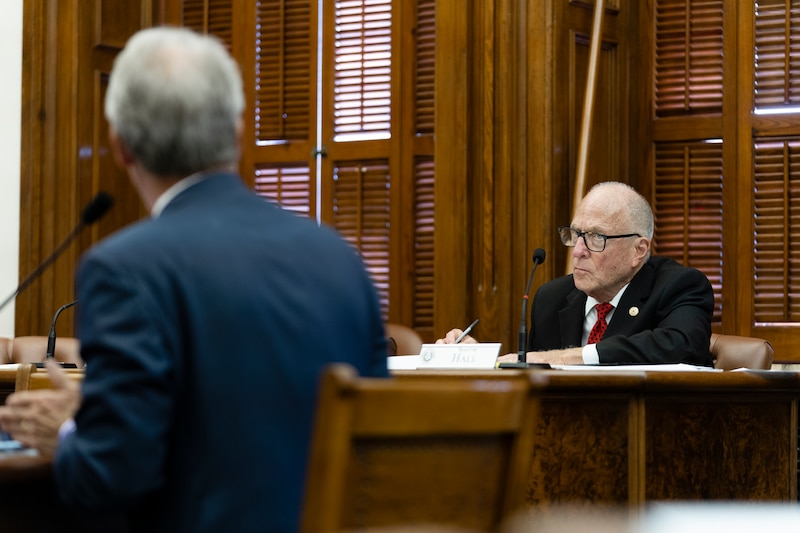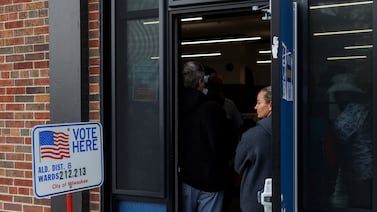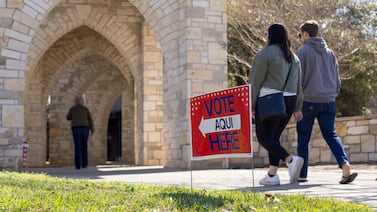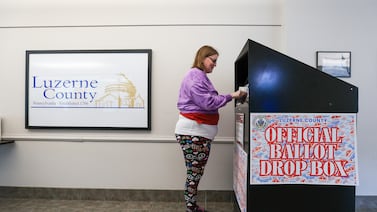Votebeat is a nonprofit news organization reporting on voting access and election administration across the U.S.
When state lawmakers passed a sweeping and controversial new election law in 2021, they quietly included a provision that drew little notice or debate.
But election administration experts say the measure is unprecedented, it mandates the purchase of voting technology that doesn’t currently exist — and it’s on the verge of costing taxpayers more than $100 million.
Sponsors of the provision said they aimed to prevent cheating in elections by prohibiting the use of modern technology to count votes and store cast ballot data. It passed without debate on a voice vote, and goes into effect just before the November 2026 general election.
When it does, millions of dollars’ worth of voting equipment will immediately be prohibited by the new law, a situation that could force at least some counties to hand-count ballots for lack of a legal alternative. Election officials across the state are worried they’ll be left without the tools necessary to safely deliver accurate and timely election results.
“Humans make mistakes. I’m very worried about the accuracy of our elections if we have to rely on a hand tally of votes,” said Chambers County Clerk Heather Hawthorne. “The inaccuracies would be huge and our state would be in trouble.”
Election security experts are also concerned. “You may be able to conduct an election but it would not be accurate, it would not be secure, and would not be timely,” said Ryan Macias, an election administration, security, and technology expert and founder of the elections consulting company RSM Elections Solutions. “With how complicated U.S. elections are, this is inconceivable.”
Here’s how it works now: With permission from the Texas secretary of state, election officials use media storage devices such as USB flash drives — provided by state-certified voting machine vendors — to collect data from ballot scanners used at precincts and voting centers on Election Day. Those drives are how officials easily and safely take that data on cast ballots to a central counting station, where they’re inserted into a tabulating computer to quickly gather results. The equipment involved is expensive, and elections officials reuse it each time an election is held, writing over the previous data with the new election data.
But the provision — proposed by Sen. Bob Hall (R-Edgewood) and supported by the then-bill’s primary author, Sen. Bryan Hughes (R-Mineola) — prohibits the use of this exact kind of data storage device that can be reused, including the ballot scanners and the tabulating machines. Experts say that, in order to fully comply with the new law, counties would have to buy entirely new voting systems each election cycle.
Lawmakers knew that, or should have — the secretary of state’s office provided cost estimates before the bill passed.
According to those estimates, it will cost taxpayers more than $116 million to replace the eliminated equipment. Because any new machines cannot be reused — the data can only be “written once” — counties would be forced to continue buying new equipment. The secretary of state’s office estimates that this ongoing cost will be more than $37 million every two years.
And that’s if counties can even find compliant voting technology to buy. The Texas secretary of state’s office says the two Texas-certified voting machine vendors, Hart InterCivic and Election Systems & Software, also known as ES&S, do not currently build such machines. In fact, no machine matching the specifications has been invented by any company operating in the United States. Nonetheless, Hall’s provision requires states to have purchased and implemented the technology by Sept. 1, 2026.
Hall did not respond to multiple requests for an interview, nor did Hughes. In an emailed statement to Votebeat, Hall insisted his intention was “to provide an additional measure of security,” and that the technology would ensure that final counts represent voter intent. Asked how he’d achieve additional security by requiring counties to buy nonexistent machines, he did not respond. Asked to offer his thoughts on the total cost to taxpayers, he did not respond.
Hall said much the same when he offered the bill on the floor in 2021. The provision would, he said, prevent votes from being “manipulated” between the precincts or vote centers and the central counting station. Hall provided no evidence of any instances of manipulation at the time, nor did he do so for this story. He also did not respond to questions about the practical application of the law.
His bill requires that all cast-ballot data be stored in such a way that “once written, [they] cannot be modified.” The technology is often referred to as “WORM,” which stands for “write once, read many,” and nearly always refers to CD or DVD drives and their associated discs.

The $100,000,000 price tag is only the beginning
Without a voting system that is certified to comply with the provision of the law, the secretary of state’s office will have to work closely with county election officials to provide guidance on how to implement an alternate counting procedure, Sam Taylor, a spokesperson for the secretary of state, said in a statement.
Some counties could be forced to hand-count election results, which multiple studies and experts have said comes with a higher risk of fraud and inaccuracies, could result in legal challenges, and will take more time, staffing and more money to get done. A review of Arizona’s Maricopa County’s 2020 election results took months, more than 100 people, and cost taxpayers more than $1 million to recount more than 2 million ballots.
“We’d have to provide extensive training, but ultimately [counties] would have to handle the logistics,” Taylor said. Election officials who violate a provision of the state Election Code, such as by using equipment that isn’t certified by the state, could face civil penalties, legal challenges, or lose their job.
The eye-popping costs are particularly frustrating for election officials, many of whom just bought new equipment to comply with a different law passed in 2021 that required a “paper audit trail” by 2026.
More than 230 counties out of the 254 counties in the state have already complied with that law. Many were already using equipment that produced a paper trail in the form of a printed ballot. Others purchased all new equipment or modified their existing machines with printers. Harris County was the last major county to recently make the switch, Taylor said.
Ballot scanning devices — which scan information in voted paper ballots and convert it into electronic data — cost anywhere from $5,000 to $100,000, election officials told Votebeat. Counties, depending on their size and the number of precincts and voting centers they operate, will purchase a dozen or hundreds of those. The USB drives — which come with permissions that only allow them to be opened on specific hardware, a security measure — each cost between $50-$70. Counties often buy hundreds. During the November election, Harris County used more than 3,000 such drives.
In smaller counties, large purchases such as these are simply not in the budget.
Cynthia Lum, Houston County’s elections administrator, said the county of about 13,000 purchased new voting equipment in 2021. The county transports vote totals to a central tabulation room on USB drives, as do most counties in the state. It uses one central count ballot scanner. “If it has to be replaced, our county does not have that kind of funds to just scrap it and start fresh,” she said.
Hawthorne, the Chambers County Clerk, was also confident her county can’t afford it. “To throw away those tax dollars is ridiciculous and it’s concerning. I trust our equipment, we test it for accuracy, and what [Hall] wants doesn’t exist,” she said. “So this dream [Hall] has that this is the technology that should be used, I’m worried because how does he know that it’s safe and it works if it doesn’t even exist?”
Chambers County, southeast of Houston, has 35,000 registered voters and uses Hart Intercivic voting equipment. Hawthorne said the county uses 20 ballot scanners at polling locations and two tabulation scanners at the central counting station. Given the law’s language, the county will be prohibited from using all that technology, along with 100 USB drives used to gather voters’ cast ballots and election results.

Security measures already in place
Counties –big and small– already have security measures in place that election workers follow to protect voters’ cast ballots, both electronic and physical.
Election officials follow a state-mandated chain of custody tracking procedure for their equipment. The equipment is labeled and sealed to ensure nothing is tampered with, and representatives from both parties are present when votes are counted. As part of Texas’ new election law, poll watchers are now allowed to see every part of the election process and follow election workers who take the ballots and USBs from the polling place to the central counting station. The law also requires election departments in counties with more than 100,000 residents to use 24-hour video surveillance of the vote counting process.
Additionally, both voting machine vendors have to pass strict security checks and testing to obtain federal and state certification.
“And yet there is still this level of scrutiny from our legislators that are sending the message even back to their own districts that ‘we don’t trust you as elections officials’,” Hawthorne said.
Hall offered the provision as a Senate floor amendment to the GOP’s first version of a restrictive voting bill authored by Hughes in March 2021 during the regular 87th legislative session. Hughes lauded the proposal.
“I think it’s a great amendment,” Hughes gushed. “This amendment would make sure that the media they use cannot be written over, it’s just making sure that they can’t cheat. No Republican, Democrat or Independent can cheat between the polling place and when the votes get into central count.”
Neither Hall’s nor Hughes’ advocacy on these issues was a surprise to election officials.
Hall is known to be more conservative than every other GOP member of the Senate and has a record of introducing pieces of legislation based on conspiracy theories.
He has made “election integrity” one of his policy priorities, and even appeared as a featured speaker at an event streamed and promoted online by The America Project – an organization led by former President Donald Trump allies Michael Flynn and former Overstock CEO Patrick Byrne, both well known for spreading election fraud conspiracy theories.
At the event, which happened at the beginning of this legislative session at the Texas Capitol, he decried “the lack of accuracy, transparency and accountability in the current Texas election process.”
None of the lawmakers on either side of the aisle questioned the amendment’s exact meaning or its implications, but some House Democrats that summer broke quorum and left the state to prevent the bill as a whole from moving forward. The debates were mostly focused around issues such as ID requirements and mail-in ballot restrictions, 24-hour and curbside voting, increasing penalties for voting illegally, and how much access poll watchers could have at the polls and at vote counting stations.
Although that bill, SB 7, ultimately didn’t pass, it became a blueprint for the bill now known as SB 1, also authored by Hughes. SB 1 passed during a second special session that summer and it included Hall’s provision.
That legislative session was the first in Texas and other states since former president Donald Trump had spread lies about the outcome of the 2020 election. Nearly 500 election-related bills were filed in Texas then.
Daniel Griffith, senior director of policy at Secure Democracy USA, said 2021 was the first time lawmakers started seeing such a high number of bills focused on election administration and the use of equipment. A provision like this one, in SB 1, a bill packed with controversial provisions, wasn’t top of mind for lawmakers.
“[Lawmakers] had a lot of other things that were distracting them and there was no legislative session last year,” he said. “So this is the first chance people will have to really take a look at [the provision]. Now that some of those distractions are out of the way hopefully they’ll be able to take it out and take care of it.”
At the time election officials also had to be selective about which pieces of legislation to prioritize and provide their input on, said Chris Davis, Williamson County elections administrator. They were focused on provisions they’d have to implement more quickly, by the following primary election.
But election officials are now devoting all of their attention to the implications these requirements will have on counties and on election officials.
“These last three sessions were just kind of like playing Whack-a-Mole,” Davis said and added that lawmakers should give other parts of SB 1 a chance to address their concerns related to election security. “Give the video surveillance a chance. Give the part of the bill that’s giving poll watchers more authority to observe things a couple of election cycles to see if their concerns are being addressed. Because right now it seems like they’re throwing everything against the wall.”
Texas Tribune reporter Pooja Salhotra contributed to this story.
Natalia Contreras covers election administration and voting access for Votebeat in partnership with the Texas Tribune. Contact Natalia at ncontreras@votebeat.org






